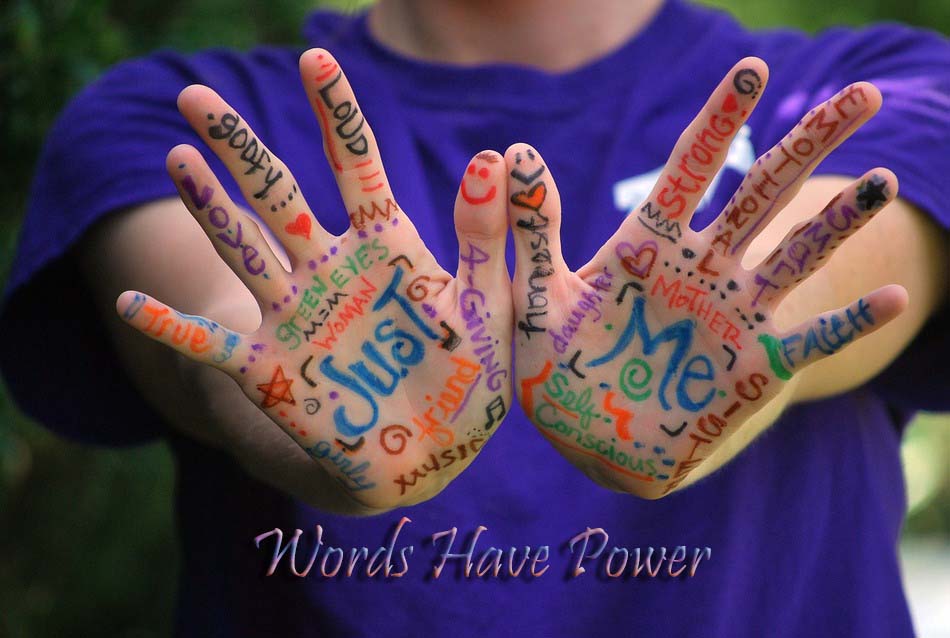In many fictional worlds, magic, and language seem to be intrinsically connected.
Whenever our favorite character cast a spell, it is connected to an incantation, mantra, or “magic words” which seem to have the power to command nature and bend reality around them.
Rarely do we learn why the magic words have the power that they do. In the Harry Potter series, for example, we get very little explanation as to why some words seem to be laced with magic potential and others do not.
Words do have a magic quality, even if this magic is not intrinsically supernatural; and the way that we speak to ourselves and others can be as damaging as the most malicious curse or as bewitching as the deepest enchantment.
The magic of words happens between people.
With careful use of language, it is possible to weave a believable picture in the mind of another person. By describing an object in detail, we can dependably transfer an image or concept from one person’s mind to another. In short, one can create an illusion or a hallucination of an object, merely through the power of words.
The most powerful use of words is not merely the descriptions we give objects, but rather, ideas and beliefs. When we successfully communicate a set of ideas or beliefs to another person, we can entirely change their understanding of the world.
I’m not describing pseudoscience like “Neuro-linguistic programming” (NLP), performances like stage hypnosis, or new-age ideas of manifestation and affirmation. Words have the potential to be laced with real, tangible, magic.
For example, once upon a time, it wasn’t uncommon for humans to believe that the Earth was at the center of the universe. The idea that the world we live in was center-stage in some cosmic drama made it seems like each human was more significant; playing an essential role in the mysterious plan of an all-knowing deity.
But what if the world was not at the center of the universe?
What if the universe was vast and indifferent, and the earth instead spun around the sun, and the sun was merely hurdling through space without a clear destination? Where does that leave us when we are no longer in the cosmic spotlight?
From one day to the next, this may not change your life. The sun still rises in the east and sets in the west. But this new perspective changes the way that we see ourselves, in relationship to everything else. To live in a world where we are the center of the universe, or to live in a world that is cosmically indifferent, is to live in two entirely different realities.
Many are subtly aware of the power of words, and thus, spend an inordinate amount of time trying to concoct the correct words in the right sequence to cast the right “spell”. They think that if they can just say the right thing, it will be convincing enough to change another person’s mind.
Imagine two people interlocked in a debate.
The two individuals put their arguments on the table and make an effort to persuade the other. Like a contest, it is possible to discern subjectively who has “won” the argument, but the problem is that neither of the two individuals participating in the argument itself has changed their minds. We can see two people masterfully using words, but the magic seems to have been lost.
Many people use words like blunt objects.
Moving through the world trying to persuade, convince and manipulate other people. In this case, their use of words is merely a means to an end. When words are just tools for manipulation, they are void of their magic quality in the same way that two people debating for sport fail to truly change each other’s minds.
Most of the time the only reason we talk, text, or send emails is because we want something, and words are the most expedient vehicle to make our wants and needs known. Thus, when most people communicate it, it almost always seems to lack a magic quality.
Words are magic when they are an end in and of themselves.
When the purpose of the use of words is merely communication and connection, then the words are invigorated with a magic potential. When two people share concepts, beliefs, and ideas for their own sake, and not to try to convince, manipulate or control the other person, suddenly the ideas can take on a life of their own.
Consider the conversations which you have found the most compelling.
These are the regrettably rare situations where two people are merely talking, sharing, and expressing interest and curiosity without judgment. Those gifted with the magic of words are able to articulate their ideas precisely but without aim. Like a work of art hanging in a museum, they can use words to paint a vivid picture, but leave the words themselves to be interpreted by the other person as they see fit.
We often find that those who are gifted in weaving magic into their words are particularly wise; they have unique lived experiences which have taught life lessons not easily found in books. When they speak and share ideas, it is as if they are reliving the experiences themselves as they are explaining them to us. When someone tells a meaningful story, shares a rare experience, or passionately recants the conclusions of their research, the words take on a magic quality.
The secret ingredient is empathy.
Magic words give others the opportunity to empathize with us; they allow the other person to take our perspective, and to briefly see the world through our unique philosophy. When we use words like blunt objects to get what we want, they are difficult to empathize with, but when communication is an end-in-itself, and not merely a means to an end, they become magic.
Philosopher Edith Stein in the book, “On the Problem of Empathy” details empathy as “the basic form in which other embodied, experiencing subjects are given to us”. In other words, empathy is the feeling that we get when we witness and become aware of the consciousness of other people.
Most of the time we regard other people as “strangers” to be avoided, ignored, or merely interacted with as a means to an end. We see other people as “objects” and in doing so we “objectify” them. But when we encounter evidence that other people are just as conscious as we are; that they have their own mind, “soul” and lived experiences just as vivid and complex as our own, we suddenly “empathize” with them.
They are no longer merely an object, but become a “subject”, and this awareness of the subjectivity of others is itself “empathy”, according to Stein. When others empathize with us, and vice-versa, the resulting connection leaves a lasting impression on us. In many cases, these magic encounters change the way we see the world in subtle ways, for better or for worse, as enchanting revelations or baneful curses.
While this is an admittedly whimsical explanation, it seems there are many things about communication, interpersonal relationships, and the magic of words that we cannot fully articulate. There is something declaratively healing, curative, and therapeutic about merely authentic connection with others as evidenced by decades of research on psychotherapy outcomes.
While psychologists have techniques, theories, and frameworks that guide therapy, time and time again it has been proven that the most potent “magic” of how therapy helps to cure depression and anxiety is the relationship itself.
Magic is not manipulation, persuasion, or the ability to “get what you want” from any conversation or interaction. The magic is found in the brief yet profound windows of empathy that we open for others and that others open for us.
When we speak from an authentic authority, expressing our truth through the lens of lived experience and connection, we cast powerful spells capable of changing the people and the world around us.
![]()


























